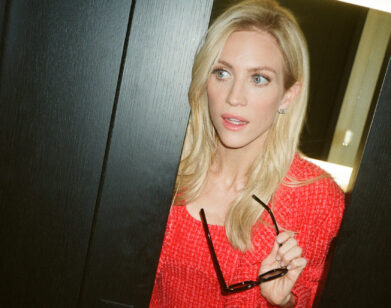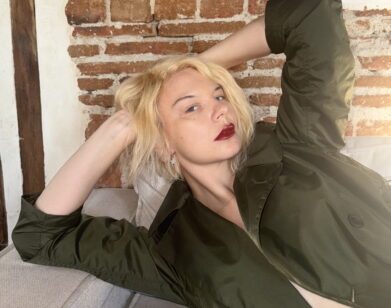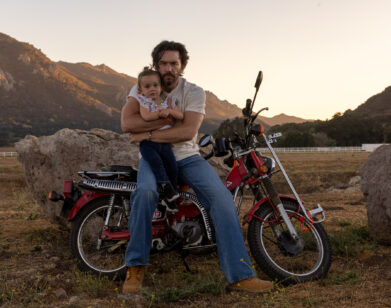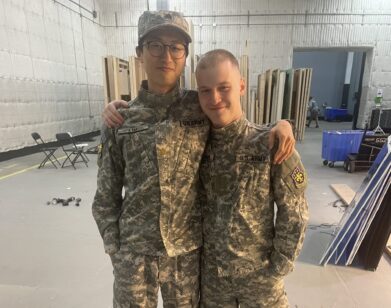IN CONVERSATION
Charlie Kaufman and Iain Reid on the Terrifying Art of Adaptation
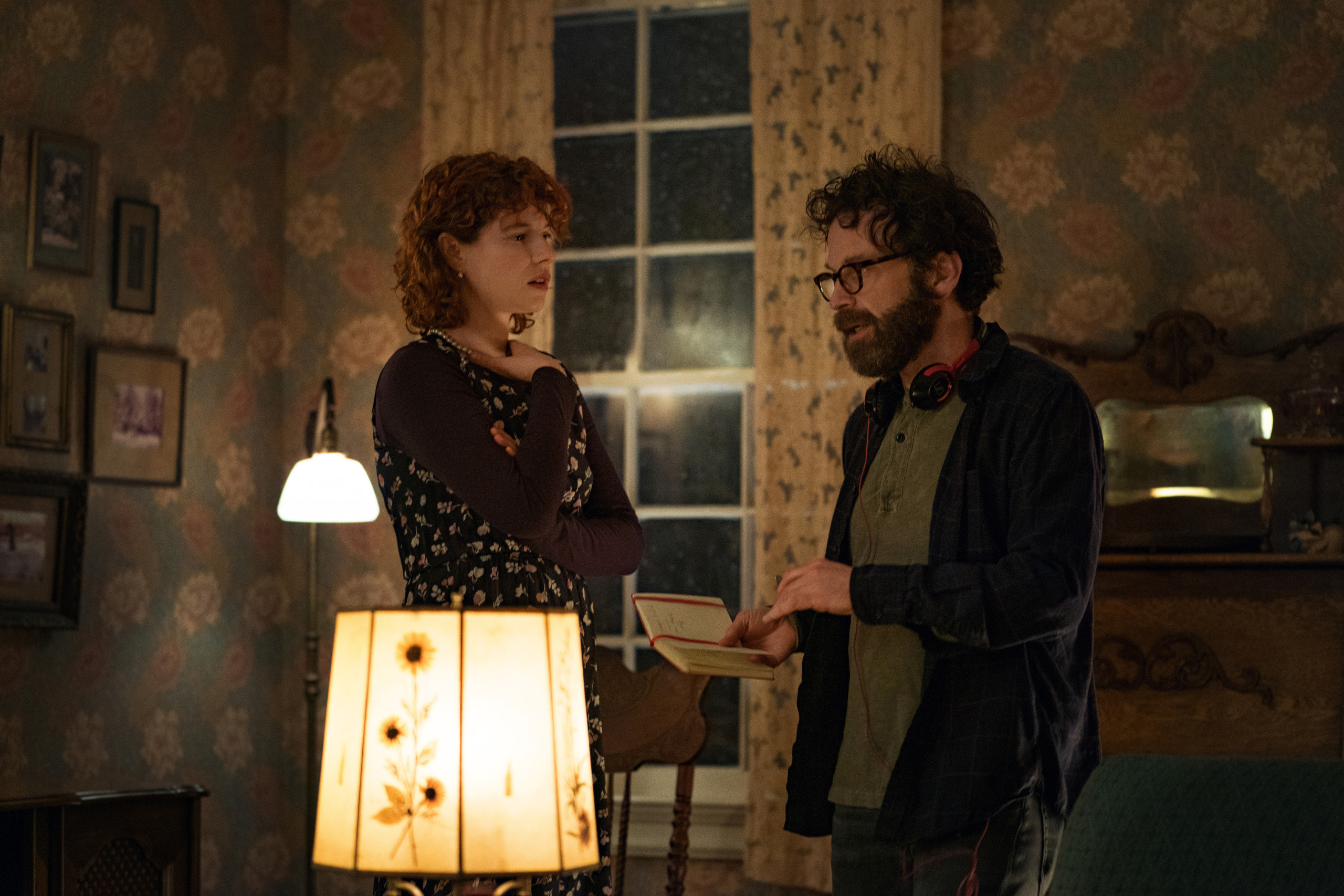
Im Thinking Of Ending Things. Jessie Buckley as Young Woman, Charlie Kaufman as Director in Im Thinking Of Ending Things. Cr. Mary Cybulski/NETFLIX © 2020
In his 2002 film Adaptation, Charlie Kaufman portrayed the process of turning someone else’s book into a screenplay as a special kind of torture. Tasked with adapting Susan Orlean’s non-fiction book The Orchid Thief for the big screen, Kaufman instead wrote a meta exploration of the process itself, specifically about how painful it can be. It’s a wonder, then, that he would dare to do it again. But here we are, 18 years later, and Kaufman has not only written an adaptation, but directed it as well. I’m Thinking of Ending Things, which is currently streaming on Netflix, is the 61-year-old filmmaker’s take on the 2016 debut novel from the Canadian writer Iain Reid. The thriller stars Jesse Plemons and Jessie Buckley as a young couple who embark on a road trip to visit his parents at their farmhouse. A snowstorm rolls in and the parents emerge, at which point things get downright Kaufman-esque. Recently, Kaufman and Reid connected via Zoom to discuss, well, adaptation.—BEN BARNA
———
IAIN REID: Well, Charlie, I guess the first thing I would ask you is, can you remember when and how you came across the book?
CHARLIE KAUFMAN: I feel like it was recommended to me on Amazon, based on stuff that I purchased or looked at. And I remember reading the synopsis of it and it sounded really intriguing and mysterious, sort of dreamy, which is the kind of thing that I like.
REID: So the algorithm was right in this case.
KAUFMAN: Yeah, and it’s been right a fair amount in my life.
REID: And then you inquired if the rights were still available?
KAUFMAN: What I tend to do is find things I like, and then I call my agent and ask if the book has been optioned or if it’s owned by anybody, and it wasn’t at that point. So we were connected, and we talked about it, and then down the road, I spoke to Anthony Bregman who ended up being the producer, and he said that Netflix would be interested in it if I were to make it. And so he and I went to Netflix and had a meeting with them, and we talked a bit in somewhat vague terms about what the movie would be, because I really didn’t know. And then they agreed to finance it.
REID: Did you find the fact that the book was short potentially appealing?
KAUFMAN: Well, I was not just looking for things to read. I was looking for things to read that I might be able to make into a movie. And this book, because of its irrational and surreal nature, appealed to me. But it was also short. It was contained. It took place in a car and a farmhouse, more or less. So I thought, “This wouldn’t cost that much money to make.” And I wasn’t in a position to get a big budget for anything. I’ve been trying for years to get even a moderate budget and haven’t been successful. Also, I liked that the confined nature of it presented challenges.
REID: Do you mean confined as far as the settings, or something more internal?
KAUFMAN: Both. But what I meant specifically was that most of it took place in a car. It seems very un-cinematic on the surface. And that appealed to me as an idea, to try to figure out how to make it compelling, because the book does it successfully.
REID: So the inherent challenge of how internal it is was actually appealing to you.
KAUFMAN: It’s in somebody’s head, but not necessarily in the head that you think it’s in, which appealed to me as a concept.
REID: When I arrived at where you guys were filming for the first time, it was eerily similar to what I had in my mind when I was writing the book.
KAUFMAN: I’m glad to hear that. It was hard for us to find that place. Our intention was to build a farmhouse and we just couldn’t afford it. So then it was like, “We have to find a place and somehow decorate it. And that was the money we could spend. And so that’s where we came up with all the ideas of the varied wallpaper and the clashing and stuff. We were trying to create these different spaces in what amounted to a very small space. If we were to build a farmhouse, we could build it as big as we wanted to, and make it look as small as we wanted it to. The intent was to make it feel different in memory than it felt in reality. We wanted it to feel very empty and lonely, but very lush in the memory, in the way that when you remember something from your childhood, you remember every detail.
REID: Even the color.
KAUFMAN: The color, everything. You study it and you know it, and it’s your world. And then as you get older, at least for me, I don’t have the same relationship with the places I live in anymore. I don’t know them as well. Even though I’ve lived in some of those places much longer than I did in my childhood home, I knew stains on the carpet when I was a kid.
REID: When I arrived on set, my sense was, “I just don’t want to get in anybody’s way.” I had visions of arriving on set and somehow unplugging the wrong thing, and the one shot you wanted doesn’t get recorded. I think it was my first time on a film set, and what I really remember is just how many people are there, the amount of collaboration and the number of jobs there are, from the sound people to the people making food, to the actors who sit in for the actors when they’re not there. The big takeaway was how different it is to writing a novel, which you know about, too. When we first started talking, we were sending a lot of casting stuff back and forth. I remember sending you different actors, and you sending me a variety of people, both people I had heard of and people I’d never heard of.
KAUFMAN: We were all over the map, more specifically with the young woman. We were looking at actresses from different countries, deciding whether or not she could be German or not, because there was no German actress we liked for the part. It was fun to do.
REID: It was really fun. To me, it’s almost akin to when you’re first starting a novel and it still hasn’t taken shape yet. You still don’t know what you’re going to have. I think you and I are very similar in the way we work, in that we don’t plan things out in that way beforehand, which I think is rare.
KAUFMAN: When we thought of a person from a very different background, it fed into what the story would be, because ultimately he didn’t know her. In his mind, she has an accent.
REID: Exactly.
KAUFMAN: I think we even discussed how cool it would be if in some variations she does have an accent, then doesn’t. It leads to other possibilities, which is always fun.
BEN BARNA: What kind of content have you guys been consuming in quarantine?
REID: Well, one thing I read was Charlie’s book [Antkind]. I really enjoyed that. I’d been waiting to read it because I was aware of it for a while and knew he was working on it. I love coming across long books because I don’t feel like there are as many long books as there used to be. I’ve been listening to a lot of music, just because I’ve been going for walks. There’s not a lot of opportunity to do much else as far as exercising, so I’ve been walking most days. I’ve been listening to the band Metz, which a friend of mine is in. They have a new record coming out this fall. I haven’t been watching as much recently. I know a lot of people have been watching a lot during the pandemic, and I can understand why. This is not very interesting, but I’ve been sitting and watching birds a lot, and I’ve been in my garden quite a bit planting stuff. What about you, Charlie?
KAUFMAN: I’m reading a bit, but I’m having difficulty focusing. I walk as well, but I don’t listen to music when I walk because I use my time while walking to work.
REID: Are you actually taking notes or are you just thinking?
KAUFMAN: I do both. I have a notebook with me and I think, and because my memory is not good enough for me to remember what it is that I’m thinking about, I take notes copiously. What else? I’ve got a couple of jobs that I’m doing.
REID: And you’re in New York right now, right?
KAUFMAN: I’m in New York.
BARNA: How are you finding the city, and what do you think about its prospects as it moves forward through this pandemic?
KAUFMAN: I don’t know what the answer is or what’s going to happen, but I do think it’s possible that the city can change back into something that it should be, and it should have been for a long time, which is a place where people can afford to live and work. And where there aren’t just rich people buying everything up and leaving everybody else out in the cold. So if the wealthy people are leaving, which they seem to be, and the big franchise businesses are leaving, which they seem to be, that could and will cause a kind of devastation at first, but perhaps it opens the city up to being a more vibrant place and a less corporate place. I’m hoping. I think that would be the best version of what can happen.
BARNA: How do you feel about your movie being released directly on Netflix, and audiences missing out on seeing it in the theater? Does it drive you crazy thinking that some people will inevitably watch it on their phone, in multiple parts?
KAUFMAN: What you just described is not ideal. I would like them to watch it on a larger TV screen and I would like to hope they’d get all the way through. Before the pandemic hit, Netflix was going to have a theatrical release attached to this, and that would have been nice, but obviously they can’t, and that’s completely understandable. I do like the fact that it’s going to be seen by more people in theory than if it were a theatrical release and it left the theaters after two weeks, which is what my expectation would be. So there’s that. It’ll be on Netflix presumably forever, and it’s going to be available to millions and millions of people right away. So that’s a new experience for me. The movie is beautifully shot by Lukasz Zal so obviously it would benefit from being on a bigger screen instead of an Apple Watch.
REID: And one benefit of Netflix is the possibility for people to rewatch it. If you’re curious, are still thinking about it, or you have questions, you can rewatch it almost immediately, or as many times as you want. I was hoping for the same thing with the book, that you could read it twice and it would be very different both times.
KAUFMAN: I agree with that.
BARNA: How did the casting of Jesse Plemons and Jessie Buckley match up to the way you both envisioned their characters when you were writing the novel and script, respectively?
REID: I would say they absolutely did reveal new things about the characters. That’s something I got to experience for the first time, seeing something that had started in the novel transformed when Charlie wrote the script, and then transformed again when the actors were involved. I couldn’t believe my good fortune when I saw the casting. And then seeing them both in person when I was there during the shooting and then seeing the final product, I was just amazed. The work they do in the movie is astounding, and yes, it made me see those characters that had originally started the book in different ways.
KAUFMAN: When you think about the book now, do you picture the characters as you pictured them when you were writing it, or as they appear in the movie?
REID: I haven’t re-read it because I always have a hard time re-rereading things that I’ve written after a while. But that’s interesting. I don’t really have a particular image in my head of characters when I’m writing them.
KAUFMAN: You had a physicality. Heights and that sort of thing.
REID: In the book, there really isn’t all that much physical description. For Charlie, and for you, like me, the internal world is more interesting, so I really didn’t have a set vision for any of the characters. What’s in the book is really all I had. I had Jake as being a little bit taller and kind of ganglier, and his girlfriend being a little bit shorter. And then people who read it can come up with their own descriptions. There’s something about Jessie and Jesse together, their chemistry really is amazing. And I think people are really going to appreciate that when they watch it.
KAUFMAN: The reason I asked that question is because when I think about original screenplays I’ve written, people will say, “Are Jim Carrey and Kate Winslet who you thought of when you wrote Eternal Sunshine of the Spotless Mind?” And the answer is obviously no, because they weren’t cast at that point, but that’s who I picture as Joel and Clementine now. I can’t really even remember what I pictured them like beforehand. If I forced myself, I could go back to it and realize, “Okay, this person was based on this person.” But I don’t picture those people anymore.
REID: I guess the only one for you would have been John Malkovich when you were writing Being John Malkovich.
KAUFMAN: I actually pictured Craig [played by John Cusack in Being John Malkovich] as somebody very small. I imagined someone like myself.

